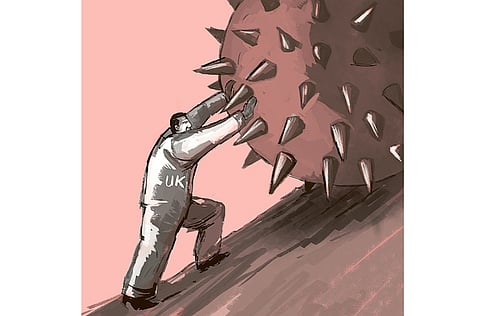Cameron’s Sisyphean ideological war
Changing minds needs balance between heavy-handedness and efforts to gain trust

British Prime Minister David Cameron is rattled by the thought of battle-hardened British citizens, currently fighting with the so-called Islamic State of Iraq and the Levant (Isil), returning home bent on revenge. More than 1,000 westerners have signed-up with this maniacal band, up to six hundred of them being Britons — and many more would do so if not for the threat of arrest. Last Friday, the British government raised its terror alert level from “substantial” to “severe” while stressing an attack was not believed to be “imminent”. The final straw appears to have been the decapitation of an American journalist by a masked terrorist with a British accent, combined with US airstrikes on Isil convoys in northern Syria.
The heightened alert allows for enhanced state powers to confiscate passports, the empowerment of police to keep tabs on at least 300 known returnee radicals, a revival of the controversial ‘snoopers charter’, permitting intelligence services access to all communications and the possible reintroduction of control orders. Police patrols at points of entry will be substantially beefed up. Those who attempt to recruit jihadists will be arrested. Hate preachers will be banned.
Cameron has highlighted the need to tackle extremist Islamist ideology head-on at the root before “it takes the form of violence and terror”, which “means challenging the thinking of extremist ideologues, identifying the groups in this country [Britain] that push an extremist agenda and countering them by empowering the overwhelming majority that believe in British values ...”
“Adhering to British values is not an option or a choice, it is a duty for those who live in these islands,” he said. However, thwarting the spread of what he terms the “poisonous ideology of Islamist extremism” — a trend that bears no relation to the West’s military interventions in the Middle East he claims — may be akin to shutting the stable door after the horse has bolted.
For decades, Britain’s climate of political correctness has been fertile soil for those bent on manipulating minds. Extremist groups such as Minbar Ansar Deen, Boko Haram, Hizb ut-Tahrir were allowed to operate freely until comparatively recently. And even today, the United Kingdom is home to radical satellite channels and news outlets. It is notable that Cameron is hesitant to declare the Muslim Brotherhood — branded a terrorist organisation in Egypt, Saudi Arabia and the UAE — unwelcome.
A prime example of political correctness gone mad is the recent scandal relating to men of Pakistani origin in the South Yorkshire town of Rotherham. More than 1,400 children, as young as 11 years old, were sexually abused, doused with petrol, threatened with guns to their heads and trafficked over a 16-year period. Yet, the local authority and the police turned a blind eye so as to preserve race relations!
Now, with his back against the wall, Cameron has had to close his ears to the PC [political correctness] crowd, including Liberal Democrat leader Nick Clegg who has been resisting the introduction of new anti-terrorist laws on the grounds that they infringe upon civil liberties. But how successful can his policy of de-radicalisation be without cooperation from Britain’s Muslim communities?
However rosily the PM spins this new reality, many Muslims will undoubtedly feel they have been singled out, which could serve to accelerate rather than defuse extremist tendencies. Placing a heavy accent on “British values” and preaching no tolerance for communities that live “separate lives” from the rest of the country will not resonate well in areas of east London, Bradford or Birmingham. Moreover, Cameron’s insistence that US-dominated western foreign policy has no relationship to the surge in extremist views is patently false. Be that as it may, terrorist recruiters use the invasions of Afghanistan and Iraq as well as Israel’s onslaughts on Gaza to make the point that Muslims are under attack.
Changing minds requires a precise balance between heavy handedness to ensure national security and sincere efforts by the authorities to gain the trust of the vast majority of law-abiding British Muslims, who need to be reassured that the government is not targeting them. Merely urging Muslim communities to adopt British values will not cut it, especially when the UK is one of the most multi-cultural countries on the planet. Why should Muslims be expected to prove they are worthy of being British when no such demand is put upon other religious or ethnic communities? That is the question that Muslims in Britain will surely be asking.
Battling ideas is further complicated by social media that is being cleverly used by Isil and other groups for propaganda purposes; whereas in my youth, opinions were largely drawn from state or mainstream media. Without engaging Orwellian-style thought police, there is no easy fix. As Cameron rightly said, this is a battle that will endure for decades. Most analysts have agreed that the first rung of the ladder begins at the grassroots level — in schools, universities and inter-faith/inter-community social gatherings. Clerics, teachers and parents need to be wooed on board. Without visible respect for Muslim sensitivities and a human approach to this dilemma on the part of the government, the ‘cure’ could exacerbate the disease’s proliferation.
Linda S. Heard is a specialist writer on Middle East affairs. She can be contacted at lheard@gulfnews.com


